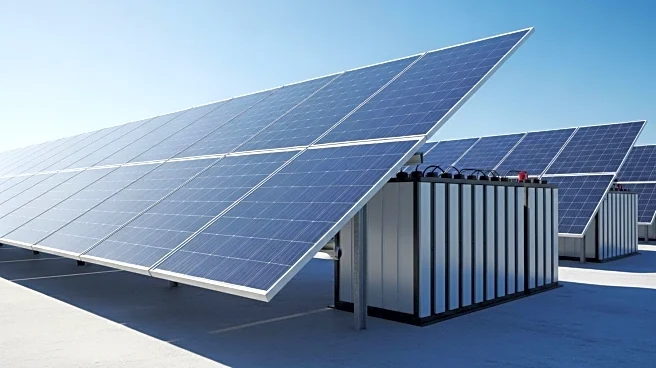What's Happening?
Egypt has launched its first utility-scale solar-plus-storage facility, marking a significant milestone in the country's renewable energy development. The Abydos Battery Energy Storage System (BESS), paired with a 500-MW solar power plant, is located near Aswan in southern Egypt. This project, developed by AMEA Power and Trina Storage, aims to stabilize Egypt's electricity grid by enabling solar power usage after sunset and reducing grid strain during peak hours. The facility is part of Egypt's broader strategy to increase its renewable energy capacity, which currently stands at 11% of its total power generation. The country plans to supply at least 30% of its energy from renewables by 2030, with significant investments in solar, wind, and hydropower.
Why It's Important?
The launch of Egypt's first utility-scale solar-plus-storage facility is a critical step towards achieving the country's renewable energy goals. This development not only enhances energy security by reducing reliance on fossil fuels but also positions Egypt as a leader in renewable energy within the region. The facility supports Egypt's Vision 2030, which aims to diversify energy sources and strengthen the national grid's resilience. By integrating advanced energy storage solutions, Egypt can better manage its energy supply, particularly during peak demand periods. This project also highlights the potential for international collaboration and investment in Egypt's renewable energy sector, which could drive further innovation and sustainability across Africa.
What's Next?
Egypt plans to continue expanding its renewable energy infrastructure, with several projects in the pipeline, including wind farms and additional solar installations. The government is actively seeking international support to meet its ambitious targets, aiming for renewables to supply 42% of its electricity by 2030. Future developments may include further integration of energy storage systems to enhance grid stability and efficiency. Additionally, Egypt's strategy to become a regional energy hub involves strengthening interconnections with neighboring countries, which could lead to increased energy exports and economic growth.
Beyond the Headlines
The successful deployment of the Abydos BESS project underscores the importance of adapting technology to local environmental conditions. Trina Storage's Elementa 2 system, designed for harsh desert climates, exemplifies how tailored solutions can ensure long-term performance and reliability. This project also reflects a broader trend towards sustainable infrastructure development, which is crucial for addressing climate change and promoting energy independence. As Egypt continues to invest in renewable energy, it may serve as a model for other countries in the region seeking to transition to cleaner energy sources.










